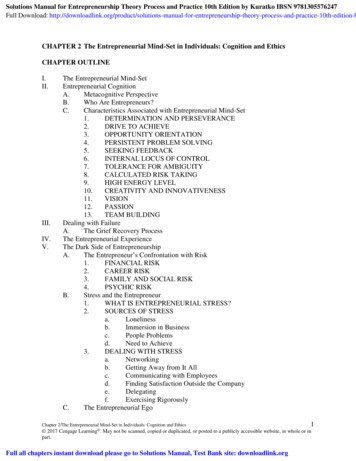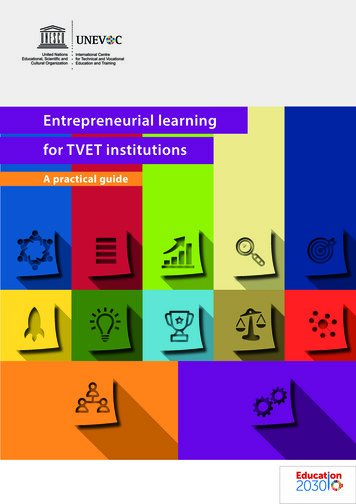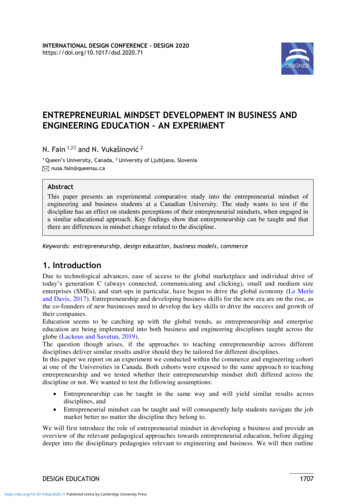
Transcription
Solutions Manual for Entrepreneurship Theory Process and Practice 10th Edition by Kuratko IBSN 9781305576247Full Download: th-edition-bCHAPTER 2 The Entrepreneurial Mind-Set in Individuals: Cognition and EthicsCHAPTER OUTLINEI.II.III.IV.V.The Entrepreneurial Mind-SetEntrepreneurial CognitionA.Metacognitive PerspectiveB.Who Are Entrepreneurs?C.Characteristics Associated with Entrepreneurial Mind-Set1.DETERMINATION AND PERSEVERANCE2.DRIVE TO ACHIEVE3.OPPORTUNITY ORIENTATION4.PERSISTENT PROBLEM SOLVING5.SEEKING FEEDBACK6.INTERNAL LOCUS OF CONTROL7.TOLERANCE FOR AMBIGUITY8.CALCULATED RISK TAKING9.HIGH ENERGY LEVEL10.CREATIVITY AND INNOVATIVENESS11.VISION12.PASSION13.TEAM BUILDINGDealing with FailureA.The Grief Recovery ProcessThe Entrepreneurial ExperienceThe Dark Side of EntrepreneurshipA.The Entrepreneur’s Confrontation with Risk1.FINANCIAL RISK2.CAREER RISK3.FAMILY AND SOCIAL RISK4.PSYCHIC RISKB.Stress and the Entrepreneur1.WHAT IS ENTREPRENEURIAL STRESS?2.SOURCES OF STRESSa.Lonelinessb.Immersion in Businessc.People Problemsd.Need to Achieve3.DEALING WITH STRESSa.Networkingb.Getting Away from It Allc.Communicating with Employeesd.Finding Satisfaction Outside the Companye.Delegatingf.Exercising RigorouslyC.The Entrepreneurial EgoChapter 2/The Entrepreneurial Mind-Set in Individuals: Cognition and Ethics1 2017 Cengage Learning . May not be scanned, copied or duplicated, or posted to a publicly accessible website, in whole or inpart.Full all chapters instant download please go to Solutions Manual, Test Bank site: downloadlink.org
VI.VII.VIII.IX.X.XI.1.Overbearing Need for Control2.Sense of Distrust3.Overriding Desire for Success4.Unrealistic OptimismEntrepreneurial EthicsEthical DilemmasA.Ethical RationalizationsB.The Matter of MoralityC.Complexity of DecisionsD.Online Ethical Dilemmas in E-CommerceEstablishing a Strategy for Ethical VentureA.Ethical Codes of ConductB.Ethical ResponsibilityEthical Considerations of Corporate EntrepreneursEthical Leadership by EntrepreneursEntrepreneurial MotivationFEATURED CONTENTThe Entrepreneurial Process: Global Breakthrough InnovatorsThe Entrepreneurial Process: Persistence Pays Off for EntrepreneursThe Entrepreneurial Process: Entrepreneurial Fear 101The Entrepreneurial Process: Shaping an Ethical StrategyLEARNING OBJECTIVES12345678To describe the entrepreneurial mind-set and entrepreneurial cognitionTo identify and discuss the most commonly cited characteristics found in successfulentrepreneursTo discuss the “dark side” of entrepreneurshipTo identify and describe the different types of risk entrepreneurs face as well as the majorcauses of stress for these individuals and the ways they can handle stressTo discuss the ethical dilemmas confronting entrepreneursTo study ethics in a conceptual framework for a dynamic environmentTo present strategies for establishing ethical responsibility and leadershipTo examine entrepreneurial motivationCHAPTER SUMMARYThis chapter describes the entrepreneurial perspective in individuals. It discusses topics that canbe useful in becoming an entrepreneur. Most of the topics have to do with personal andpsychological traits that are hard to measure but are identifiable. It describes the most commoncharacteristics associated with successful entrepreneurs, the elements associated with the “darkside” of entrepreneurship, as well as the ethical challenges that entrepreneurs confront.In attempting to explain the entrepreneurial mind-set within individuals, this chapterpresents the concepts of entrepreneurial cognition and metacognition in examining the ways inChapter 2/The Entrepreneurial Mind-Set in Individuals: Cognition and Ethics2 2017 Cengage Learning . May not be scanned, copied or duplicated, or posted to a publicly accessible website, in whole or inpart.
which entrepreneurs view opportunities and make decisions. Concepts from cognitivepsychology are increasingly being found to be useful tools to help probe entrepreneurial-relatedphenomena, and, increasingly, the applicability of the cognitive sciences to the entrepreneurialexperience are cited in the research literature. The entrepreneurial cognitions view offers anunderstanding as to how entrepreneurs think and “why” they do some of the things they do. Forexample, Cognitive adaptability, which can be defined as the ability to be dynamic, flexible, andself-regulating in one’s cognitions given dynamic and uncertain task environments, are importantin achieving desirable outcomes from entrepreneurial actions.The next part of the chapter discusses possible characteristics of successful entrepreneurs.This list is long and ever expanding and the characteristics are not exclusively the ones necessaryto become a successful entrepreneur. Some characteristics are commitment, determination, andperseverance, which are all goal oriented. Also, the drive to achieve can be goal oriented. Othertraits are correcting problems and seeking associates with feedback. These are only a few of themany that are there. Some of the traits involved in the risk area indicate that the entrepreneurmust be a calculated risk taker instead of a high risk taker. Also, the entrepreneur must have atolerance for failure; otherwise, there would be no risk. There are other traits that are personal,such as vision, self-confidence, and optimism. These traits can help with self-motivation andattitudes.An examination of failure and the grief recovery process is introduced, because failure isso often a learning experience for entrepreneurs.The next part of the chapter focuses on the dark side of entrepreneurship, whichencompasses the risks confronted by entrepreneurs, including financial, career, psychic, family,and social risk. These risks can lead to many types of stress caused by loneliness, immersion inbusiness, people problems, and the need to achieve. Possible solutions to ease stress arenetworking, getting away from it all, communicating with subordinates, finding satisfactionoutside the company, and delegating. These, of course, are not sure bets for curing stress but theycan help.The chapter then discusses the entrepreneurial ego and its negative effects. This isbrought about by a false sense of security and invincibility because the business is going well.The traits used to help diagnose this problem are the need for control, sense of distrust, the desirefor success, and external optimism.The chapter continues with a full-featured exploration of the ethical side ofentrepreneurship. Ethics is a set of principles prescribing a behavioral code that explains rightand wrong; it also may outline moral duty and obligations. Because it is so difficult to define theterm, it is helpful to look at ethics more as a process than as a static code. Entrepreneurs facemany ethical decisions, especially during the early stages of their new ventures.Decisions may be legal without being ethical, and vice versa. When making decisionsthat border on the unethical, entrepreneurs commonly rationalize their choices. Theserationalizations may be based on morally questionable acts committed “against the firm” or “onbehalf of the firm” by the managers involved. Within this framework are four distinct types ofmanagerial roles: nonrole, role failure, role distortion, and role assertion.It is also important for entrepreneurs to realize that many decisions are complex and thatit can be difficult to deal with all of a decision’s ethical considerations. Some of them may beoverlooked, and some may be sidestepped because the economic cost is too high. In the finalanalysis, ethics is sometimes a judgment call, and what is unethical to one entrepreneur is viewedChapter 2/The Entrepreneurial Mind-Set in Individuals: Cognition and Ethics3 2017 Cengage Learning . May not be scanned, copied or duplicated, or posted to a publicly accessible website, in whole or inpart.
as ethical to another. Despite the ever-present lack of clarity and direction in ethics, however,ethics will continue to be a major issue for entrepreneurs during the new century.To establish ethical strategies, some corporations create codes of conduct. A code ofconduct is a statement of ethical practices or guidelines to which an enterprise adheres. Codes arebecoming more prevalent in organizations today, and they are proving to be more meaningful intheir implementation.This chapter concludes with a model of entrepreneurial motivation, which depicts theimportant factors of expectation and outcome. It is the entrepreneur’s expectations and how wellthe outcomes of the venture satisfy those expectations that keep the entrepreneurial drivesustained.LECTURE NOTESI.The Entrepreneurial Mind-SetEvery person has the potential and free choice to pursue a career as an entrepreneur.What motivates people to make this choice is not fully understood.II.Entrepreneurial CognitionCognition is used to refer to the mental functions, mental processes (thoughts), and mentalstates of intelligent humans.Entrepreneurial cognition is about understanding how entrepreneurs use simplifying mentalmodels to piece together previously unconnected information that helps them to identify andinvent new products or services, and to assemble the necessary resources to start and growbusinesses.Metacognitive PerspectiveMetacognitive model of the entrepreneurial mind-set integrates the combined effects ofentrepreneurial motivation and context, toward the development of metacognitive strategiesapplied to information processing within an entrepreneurial environment.Who Are Entrepreneurs?Starting a new business requires more than just an idea; it requires a special person, anentrepreneur, who combines sound judgment and planning with risk taking to ensure thesuccess of his or her own business.Characteristics Associated with Entrepreneurial Mind-SetDETERMINATION AND PERSEVERANCE—More than any other factor,total dedication to success as an entrepreneur can overcome obstacles andsetbacks. It can also compensate for personal shortcomings.DRIVE TO ACHIEVE—Entrepreneurs are self-starters who appear to others tobe internally driven by a strong desire to compete, to excel against self-imposedstandards, and to pursue and attain challenging goals.Chapter 2/The Entrepreneurial Mind-Set in Individuals: Cognition and Ethics4 2017 Cengage Learning . May not be scanned, copied or duplicated, or posted to a publicly accessible website, in whole or inpart.
OPPORTUNITY ORIENTATION—One clear pattern among successfulgrowth-minded entrepreneurs is their focus on opportunity rather than onresources, structure, or strategy.PERSISTENT PROBLEM SOLVING—Entrepreneurs are not intimidated bydifficult situations. Simple problems bore them, unsolvable ones do not warranttheir time.SEEKING FEEDBACK—Effective entrepreneurs are often described as quicklearners.INTERNAL LOCUS OF CONTROL—Successful entrepreneurs believe inthemselves. They believe that their accomplishments and setbacks are within theirown control and influence and that they can affect the outcome of their actions.TOLERANCE FOR AMBIGUITY Successful entrepreneurs thrive on thefluidity and excitement of such an ambiguous existence.CALCULATED RISK TAKING—Successful entrepreneurs are not gamblers.When they decide to participate in a venture, they do so in a very calculated,carefully thought out manner.HIGH ENERGY LEVEL—Many entrepreneurs fine tune their energy levels bycarefully monitoring what they eat and drink, establishing exercise routines, andknowing when to get away for relaxation.CREATIVITY AND INNOVATIVENESS—An expanding school of thoughtthinks that creativity can be learned.VISION—Not all entrepreneurs have predetermined vision for their firm. Inmany cases this vision develops over time as the individual begins to learn whatthe firm is and what it can become.PASSION—A fundamental emotional experience for entrepreneurs characterizedby a discrete emotion that is quite intense.TEAM BUILDING—The desire for independence and autonomy does notpreclude the entrepreneur’s desire to build a strong entrepreneurial team. Mostsuccessful entrepreneurs have highly qualified, well-motivated teams that helphandle the growth and development of the venture.Chapter 2/The Entrepreneurial Mind-Set in Individuals: Cognition and Ethics5 2017 Cengage Learning . May not be scanned, copied or duplicated, or posted to a publicly accessible website, in whole or inpart.
III.Dealing with FailureEntrepreneurs use failure as a learning experience. They have a tolerance for failure.The most effective entrepreneurs are realistic enough to expect difficulties and failures.If entrepreneurs deal effectively with grief that emanates from failure then they will notbecome disappointed, discouraged, or depressed. In adverse and difficult times, they willcontinue to look for opportunity.The Grief Recovery ProcessGrief is a negative emotional response to the loss of something important triggeringbehavioral, psychological, and physiological symptoms.The emotions generated by failure (i.e., grief) can interfere with the learning process.A “loss orientation” towards grief recovery, which focuses on the failure, can sometimesexacerbate negative emotional reactions to failure.A “restoration orientation,” alternatively, enables entrepreneurs to distract themselvesfrom thinking about the failure. However, avoiding negative emotions is unlikely to besuccessful in the long-runResearch indicates that entrepreneurs may recover more quickly from a failure if theyoscillates between a loss and a restoration orientation.IV.The Entrepreneurial ExperienceThe prevalent view of entrepreneurship in the literature is that entrepreneurs createventures. Its narrow framing, however, neglects the complete process ofentrepreneurship.An experiential view of the entrepreneur moves past the static “snapshot” approach toentrepreneurship and encourages consideration of entrepreneurship as a dynamic, sociallysituated process that involves numerous actors and events.The creation of sustainable enterprises involves three parallel, interactive phenomena:emergence of the opportunity, emergence of the venture, and emergence of theentrepreneur. None are predetermined or fixed—they define and are defined by oneanother.V.The Dark Side of EntrepreneurshipCertain negative factors may envelop entrepreneurs and dominate their behavior.Although each of these factors has a positive aspect, it is important for entrepreneurs tounderstand their potential destructive side as well.Chapter 2/The Entrepreneurial Mind-Set in Individuals: Cognition and Ethics6 2017 Cengage Learning . May not be scanned, copied or duplicated, or posted to a publicly accessible website, in whole or inpart.
The Entrepreneur’s Confrontation with RiskStarting or buying a new business involves risk. A typology of entrepreneurial styleshelps describe the risk-taking activity of entrepreneurs. In this model, financial risk ismeasured against the level of profit motive (the desire for monetary gain or return fromthe venture).FINANCIAL RISK—In most new ventures the individual puts a significantportion of his savings or other resources at stake.CAREER RISK—A question frequently raised by would-be entrepreneurs iswhether they will be able to find a job or go back to their old jobs if their ventureshould fail.FAMILY AND SOCIAL RISK—Entrepreneurs expose their families to the riskof an incomplete family experience and the possibility of permanent scars.PSYCHIC RISK—The greatest risk may be to the well-being of theentrepreneur.Stress and the EntrepreneurTo achieve their goals, entrepreneurs are willing to tolerate the effects of stress: backproblems, indigestion, insomnia, or headaches.WHAT IS ENTREPRENEURIAL STRESS?In general, stress can be viewed as a function of discrepancies between a person’sexpectations and ability to meet demands.Lacking the depth of resources, entrepreneurs must bear the cost of their mistakeswhile playing a multitude of roles, such as salesperson, recruiter, spokesperson,and negotiator. Simultaneous demands can lead to role overload.Entrepreneurs often work alone or with a small number of employees andtherefore lack the support from colleagues.A basic personality structure, common to entrepreneurs and referred to as type Apersonality structure, describes people who are impatient, demanding, andoverstrung.SOURCES OF STRESSResearchers Boyd and Gumpert identify four causes of entrepreneurial stress.Loneliness—Entrepreneurs are isolated from persons in whom they canconfide. They tend not to participate in social activities unless there issome business benefit.Chapter 2/The Entrepreneurial Mind-Set in Individuals: Cognition and Ethics7 2017 Cengage Learning . May not be scanned, copied or duplicated, or posted to a publicly accessible website, in whole or inpart.
Immersion in Business—Most entrepreneurs are married to theirbusiness. They work long hours, leaving them with little or no time forcivic recreation.People Problems—Most entrepreneurs experience frustration,disappointment, and aggravation in their experience with people.Need to Achieve—Achievement brings satisfaction. However, manyentrepreneurs are never satisfied with their work no matter how well it isdone.DEALING WITH STRESSIf stress can be kept within constructive bounds, it can increase a person’sefficiency and improve performance.Networking—One way to relieve the loneliness of running a business isto share experiences by networking with other business owners.Getting Away from It All—The best antidote could be a well-plannedvacation.Communicating with Employees—Entrepreneurs are in close contactwith employees and can readily assess the concerns of their staff.Finding Satisfaction Outside the Company—Entrepreneurs need to getaway from the business occasionally and become more passionate aboutlife itself; they need to gain some new perspectives.Delegating—Entrepreneurs find delegation difficult because they thinkthey have to be at the business all the time and be involved in all aspectsof the operation.Exercising Rigorously—Research demonstrates the value of exerciseregimens on relieving the stress associated with entrepreneurs.The Entrepreneurial EgoCertain characteristics that usually propel entrepreneurs into success also, if exhibited inthe extreme have destructive implications for entrepreneurs.OVERBEARING NEED FOR CONTROL—Entrepreneurs are driven by astrong desire to control both their venture and their destiny.SENSE OF DISTRUST Because entrepreneurs are continually scanning theenvironment, it could cause them to lose sight of reality, distort reasoning andlogic, and take destructive action.Chapter 2/The Entrepreneurial Mind-Set in Individuals: Cognition and Ethics8 2017 Cengage Learning . May not be scanned, copied or duplicated, or posted to a publicly accessible website, in whole or inpart.
OVERRIDING DESIRE FOR SUCCESS This can be dangerous because thereexists the chance that the individual will become more important than the ventureitself.UNREALISTIC OPTIMISM—When external optimism is taken to its extreme,it could lead to a fantasy approach to the business.VI.Entrepreneurial EthicsToday’s entrepreneurs are faced with many ethical decisions. As there is no simpleuniversal formula for solving ethical problems, entrepreneurs have to choose their owncodes of conduct; the outcome of their choices makes them who they are.VII.Ethical DilemmasEthics provides the basic rules or parameters for conducting any activity in an“acceptable” manner.Ethics represents a set of principles prescribing a behavioral code that explains what isgood and right or bad and wrong.Ethics may outline moral duty and obligations. Legality provides societal standards butnot definitive answers to ethical questions. Because deciding what is good or right or badand wrong is situational, instead of relying on a set of fixed ethical principles,entrepreneurs should an ethical process for making decisions.Ethical RationalizationsDecision makers use one of four rationalizations to justify questionable conduct: that the activity is not “really” illegal or immoral that it is in the individual’s or the corporation’s best interest that it will never be found out that, because it helps the company, the company will condone itMorally questionable acts can be classified as: nonrole, role failure, role distortion, androle assertion.The Matter of MoralityRequirements of law may overlap at times but do not duplicate the moral standards ofsociety.Some laws have no moral content whatsoever.Some laws are morally unjust.Some moral standards have no legal basis.Legal requirements tend to be negative, morality tends to be positive.Legal requirements usually lag behind the acceptable moral standards of societyChapter 2/The Entrepreneurial Mind-Set in Individuals: Cognition and Ethics9 2017 Cengage Learning . May not be scanned, copied or duplicated, or posted to a publicly accessible website, in whole or inpart.
Complexity of DecisionsBusiness decisions, in the context of entrepreneurial ethics are complex. Why? Ethical decisions have extended consequences. Ethical questions have multiple alternatives—the choices are not always “do” or“don’t do.” Ethical business decisions often have mixed outcomes. Most business decisions have uncertain ethical consequences. Most ethical business decisions have personal implications.Online Ethical Dilemmas in E-Commerce Slow demise of face-to-face interactions cause entrepreneurs to find ways to buildtrust. Entrepreneurs recognize that online consumer reviews are used to inform purchasingdecisions and are posted to reputation management systems (Amazon and Yelp). Entrepreneurs find it far greater to exhibit strong ethical responsibility in theiractions.VIII. Establishing a Strategy for an Ethical EnterpriseEntrepreneurs need to commit to an established strategy for ethical enterprise.Ethical Codes of ConductA code of content is a statement of ethical practices or guidelines to which an enterpriseadheres.Ethical ResponsibilityA strategy for ethical responsibility should encompass three major elements: ethicalconsciousness, ethical process and structure, and institutionalization.IX.Ethical Considerations of Corporate EntrepreneursRecognize the fine line between resourcefulness and rule breaking.Recognize that unethical consequences that can result in organizations where there arebarriers to innovation.Recognize that companies can take action to combat unethical behavior by: Establishing flexibility, innovation, and employee initiative and risk-taking. Removing barriers to innovation faced by entrepreneurial middle managers. Including an ethical component in corporate training.X.Ethical Leadership by EntrepreneursThe value system of an owner/entrepreneur is the key to establishing an ethicalorganization.The owner’s actions serve as a model for all other employees to follow.Chapter 2/The Entrepreneurial Mind-Set in Individuals: Cognition and Ethics10 2017 Cengage Learning . May not be scanned, copied or duplicated, or posted to a publicly accessible website, in whole or inpart.
Caring is a feminine alternative to the more traditional and masculine ethics based onrules and regulations. by considering the interests of others and maintaining healthyrelationships, caring—according to feminists—can lead to more genuinely moralclimates.XI.Entrepreneurial MotivationThe decision to behave entrepreneurially is the result of the interaction of several factors: The individual’s personal characteristics The individual’s personal environment The relevant business environment The individual’s personal goal set The existence of a viable business idea The comparison of probable outcomes with personal expectations The relationship between entrepreneurial behavior and the expected outcomes Entrepreneurial persistence—the choice to continue with an entrepreneurialopportunity regardless of counterinfluences or other enticing alternativesSUGGESTED ANSWERS FOR DISCUSSION QUESTIONS (END-OF-CHAPTER)1.,2.What is “entrepreneurial cognition” and how does it impact the mind-set ofentrepreneurs? How does “metacognition” come into play here?In attempting better to understand the driving forces within entrepreneurs, we can gain amore complete perspective if we take a psychological look at entrepreneurs and considerthe entrepreneurial mind-set. Part of that mind-set includes the package of mentalprocesses that entrepreneurs possess, which include attention, remembering, producingand understanding language, solving problems, and making decisions. Entrepreneurialcognition refers to the knowledge structures that people use to make assessments,judgments, or decisions involving opportunity evaluation, venture creation, and growth.The metacognitive perspective calls attention to cognitive adaptability, which can bedefined as the ability to be dynamic, flexible, and self-regulating in one’s cognitionsgiven dynamic and uncertain task environments. Before an entrepreneur is prepared toevaluate alternative strategies, the entrepreneur must first formulate a strategy to framehow he or she will “think” about this task. This process is metacognitive. The processresponsible for ultimately selecting a response (i.e. a particular venture strategy) iscognitive—the process responsible for ultimately selecting how the entrepreneur willframe the entrepreneurial task is metacognitive.Entrepreneurs have a tolerance for ambiguity, are calculated risk takers, and exudepassion. What do these characteristics mean for any potential entrepreneur?Entrepreneurs face uncertainty compounded by constant changes that introduceambiguity and stress into every aspect of the enterprise. A tolerance for ambiguity existswhen the entrepreneur can deal with the various setbacks and changes that constantlyconfront him or her.Successful entrepreneurs are not gamblers—they are calculated risk takers. They doeverything possible to get the odds in their favor, and they often avoid taking unnecessaryChapter 2/The Entrepreneurial Mind-Set in Individuals: Cognition and Ethics11 2017 Cengage Learning . May not be scanned, copied or duplicated, or posted to a publicly accessible website, in whole or inpart.
risks. These strategies include getting others to share inherent financial and business riskswith them—for example, by persuading partners and investors to put up money, creditorsto offer special terms, and suppliers to advance merchandise.Entrepreneurial passion is a fundamental emotional experience for entrepreneurs. It is adiscrete emotion that is quite intense being described as an underlying force that fuels ourstrongest emotions, or the intensity felt when engaging in activities that are of deepinterest, or the energy that enables entrepreneurs to achieve peak performance.3.Is it true that most successful entrepreneurs have failed at some point in theirbusiness careers? Explain.The most effective entrepreneurs are realistic enough to expect difficulties and failures.Entrepreneurs use failure as a learning experience; hence, they have a tolerance forfailure.4.How should failure be dealt with by entrepreneurs? How does “grief” play a role inthis process?As noted above, the most effective entrepreneurs are realistic enough to expectdifficulties and failures. If they can deal effectively with any grief that emanates from thefailure then they will not become disappointed, discouraged, or depressed by a setback orfailure. In adverse and difficult times, they will continue to look for opportunity. In thisway entrepreneurs will believe that they learn more from their early failures to form thefoundation of later successes. Research shows that an entrepreneur recovers more quicklyfrom a failure if he or she oscillates between a loss and a restoration orientation. Thisoscillation means that the entrepreneur can gain the benefits of both orientations whileminimize the costs of maintaining either for an extended period.5.Entrepreneurship has a “dark side.” What is meant by this statement? Be completein your answer.The dark side of entrepreneurship is a destructive course that exists within the energeticdrive of a successful entrepreneur. There are three major traits that are associated with thedark side of entrepreneurship: risk, stress, and the entrepreneurial ego. All potentialentrepreneurs need to be aware that the dark side of entrepreneurship exists.6.What are the four specific areas of risk that entrepreneurs face? Describe each.The four specific areas of risk are as follows:1.Financial risk—In most new ventures the individual puts a significant portion ofhis savings or other resources at stake.2.Career risk—A question frequently raised by would-be entrepreneurs is whetherthey will be able to find a job or go back to their old jobs if their venture shouldfail.3.Family and social risk—Entrepreneurs expose their families to the risk of anincomplete family experience and the possibility of permanent scars.4.Psychic risk—The greatest risk may be to the well-being of the entrepreneur.Chapter 2/The Entrepreneurial Mind-Set in Individuals: Cognition and Ethics12 2017 Cengage Learning . May not be scanned, copied or duplicated, or posted to a publicly accessible website, in whole or inpart.
7.What are the four causes of stress among entrepreneurs? How can an entrepreneurdeal with each of them?There are four causes of stress: loneliness, immersion in business, people problems, andneed to achieve. To reduce stress, entrepreneurs must define the cause of the stress. Afterclarifying the cause of stress, the entrepreneur can combat excessive stress byacknowledging its existence, developing coping mechanisms, and probing personalunacknowledged needs.8.Describe factors associated with the entrepreneurial ego.The factors associated with the entrepreneurial ego include: an overbearing need
V. The Dark Side of Entrepreneurship A. The Entrepreneur's Confrontation with Risk 1. FINANCIAL RISK 2. CAREER RISK 3. FAMILY AND SOCIAL RISK 4. PSYCHIC RISK B. Stress and the Entrepreneur 1. WHAT IS ENTREPRENEURIAL STRESS? 2. SOURCES OF STRESS a. Loneliness b. Immersion in Business c. People Problems d. Need to Achieve 3. DEALING WITH STRESS .











